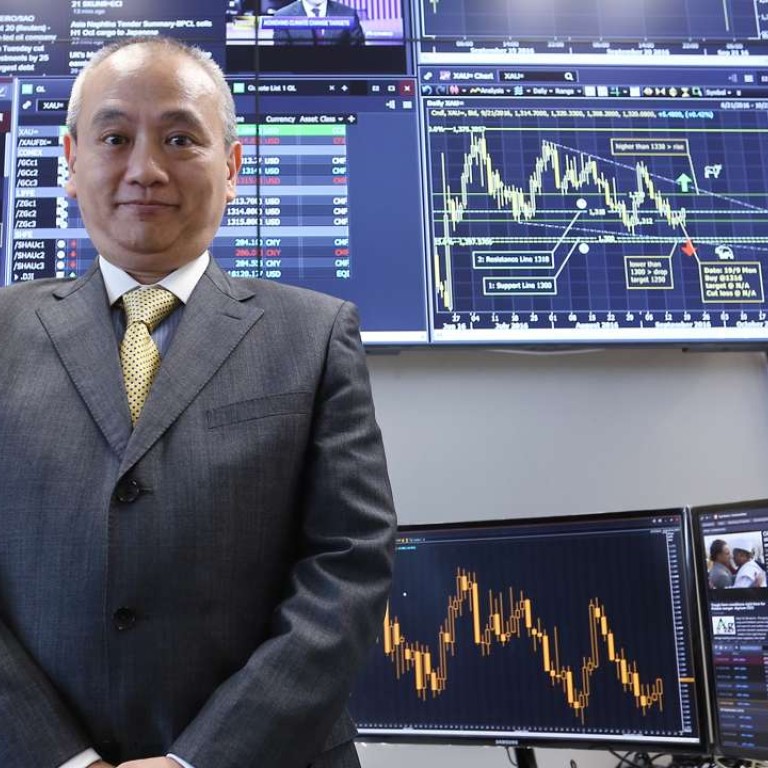
SFC must cut margin limit if Hong Kong is to compete with Singapore as forex hub, say traders
The financial regulator says the 5 per cent FX trading margin, which compares to Singapore’s 2 per cent, is to shield brokers from volatility
Hong Kong’s financial regulator should relax margin trading requirements if the city is to compete with rival Singapore in foreign exchange trading, as the internationalisation of the yuan provides a good opportunity for the city to climb the world rankings, according to veteran traders.
Hong Kong overtook Tokyo to become the world’s fourth-largest forex trading centre in April this year, but it still lags behind London, New York and Singapore.
Jasper Lo, chief executive of King International and a forex trader of 30 years, said the tight margin trading is a key reason Hong Kong is losing out to other financial centres. The Securities and Futures Commission currently sets the minimum forex trading margin at 5 per cent, compared with 2 per cent in Singapore and the US, while London has no margin limit. The industry average is about 0.5 per cent.
For the [Hong Kong] forex market to become active again, the SFC must let currency brokers freely negotiate margin with customers
“This means investors can trade 20 times their initial deposit on forex trading in Hong Kong, 50 times in Singapore and New York, and 200 times in London,” Lo told the South China Morning Post. “This means investors can use much less money to trade the same amount of forex in London, New York and Singapore. This is why Hong Kong has lost out.”
The SFC says the margin is designed to protect leveraged forex brokers against volatility in the foreign exchange markets.
Wilson Chan, a former currency trader who is now an associate director of the MBA program at the City University of Hong Kong, said: “In Australia, the margin requirement is only 1 per cent and many Hong Kong investors trade forex via the Australia market. If Hong Kong would reduce the margin level, it needs to cut it substantially to get closer to Australia or it won’t be able to compete for business.”
However, Chan said the regulator would need to consider risk issues as the forex market could be very volatile.

Lo, who recently led the set up of King International, which is applying for a forex trading license in Hong Kong, said Hong Kong was a top three forex market in the 1980s, just behind London and New York.
“Back then, many British forex trading firms set up here with many talented traders, while the number of forex investors was no less than those in the stock market,” he said.
The Hong Kong forex market declined after many British firms moved to Singapore in the early 1990s, fearing political uncertainty ahead of the 1997 handover of Hong Kong to the Chinese.
Then in 1994, the SFC introduced new laws to regulate leveraged forex companies, including the margin trading limits. Previously there was no margin requirement in forex trading in Hong Kong and many brokerages would collect just 1 per cent.
This has prevented malpractice but also led to a decline in the number of players in the market from 52 in 1994 down to 42 today. The number of SFC-licensed forex traders stands at just 1,028, compared with 25,861 in securities trading.

Gary Cheung, vice-chairman of Hong Kong Securities Association and a veteran stock and currency broker, agreed that the SFC must cut the margin in order to reignite the forex market in Hong Kong.
Cheung said that before the SFC introduced the regulation in 1994 many stockbrokerage houses also ran a forex desk, with the margin level agreed between the brokers and the investors.
“The SFC has not set margin levels on individual stock trading and lets the brokers negotiate with customers. It uses other measures to ensure the financial security of the stockbrokers. This is why the stock market is very active,” Cheung said.
“For the forex market to become active again, it is important for the SFC to adopt the same approach on forex trading, and let the currency brokers freely negotiate margin with customers.”
He said the decline of the forex market has meant fewer people have been learning forex trading and becoming brokers in the sector.
“If the forex market becomes active again, it is natural more people would take up courses in forex trading and join the industry,” Cheung said.
Singapore has a distinct advantage over Hong Kong as an FX trading hub due to its more diverse FX trading pool
An SFC spokesman said: “An adequate level of minimum initial margin is to provide a cushion for leveraged forex brokers against the sharp volatilities of the forex markets, as recent and past events have demonstrated. We welcome views from the industry and will keep in view of their suggestions.”
Andrew Fung, executive director of Hong Kong lender Hang Seng Bank, said overheads were another factor giving Singapore an edge over Hong Kong as a forex hub.
“For major currencies such as the euro and Japanese yen, more US and European banks may have their market and traders located in Singapore due to costs such as office rental. The South Asia emerging market currencies and stock markets such as India are investors’ favourites in the last two year, and that helps Singapore too.”
Heng Koon-how, a senior investment strategist at Credit Suisse in Singapore, said Hong Kong is the obvious choice for investors who are keen to focus on offshore yuan trading.
“Beyond that, Singapore has a distinct advantage over Hong Kong as a FX trading hub due to its more diverse and deeper FX trading pool,” Heng said. “Singapore has an active focus on trading in South East Asian currencies and Australian and New Zealand currencies. Most Australian mining and commodity firms have Asian offices in Singapore.”

